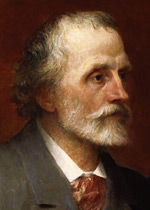George Meredith
| Full Name: | George Meredith |
| Born: | February 12, 1828 Portsmouth, Hampshire, England |
| Died: | May 18, 1909 Box Hill, Surrey, England |
| Occupation: | Writer |
| Nationality: | British |
| Links: |
|
Biography
George Meredith OM was an English novelist and poet of the Victorian era. At first his focus was poetry, influenced by John Keats among others, but he gradually established a reputation as a novelist. The Ordeal of Richard Feverel (1859) briefly scandalized Victorian literary circles. Of his later novels, the most enduring is The Egoist (1879), though in his lifetime his greatest success was Diana of the Crossways (1885). His novels were innovative in their attention to characters' psychology, and also took a close interest in social change. His style, in both poetry and prose, was noted for its syntactic complexity; Oscar Wilde likened it to "chaos illumined by brilliant flashes of lightning". He was an encourager of other novelists, as well as an influence on them; among those to benefit were Robert Louis Stevenson and George Gissing. He was nominated for the Nobell Prize in Literature seven times.
Meredith was the only child of Augustus Urmston Meredith and his wife Jane Eliza (née Macnamara). The name Meredith is Welsh, and he would describe himself as "half Irish and half Welsh" (on his mother's and father's sides, respectively). He was proud of his Welsh origins, and such pride is evident in his novels. His biographer Lionel Stevenson explains that Meredith's paternal grandfather, Melchizedek, would sometimes "boast eloquently of his princely forebears", but "between his immediate forebears and the legendary Welsh princes of seven centuries before, the history of the family remains obscure."
Augustus Meredith was, as Melchizedek Meredith had been before him, a naval outfitter, and among his employees was James Watson Gieve. Jane died when her son was five, and the outfitting business failed, with Augustus declared bankrupt in November 1838. He moved to London and in July 1839 remarried -- his second wife being the family's former housekeeper, Matilda Buckett.
George Meredith was educated in Southsea until 1840, when a legacy from his mother's sister, Anna, made it possible for him to attend a boarding school in Lowestoft, Suffolk. In August 1842 he was sent to the Moravian School in Neuwied, near Coblenz, where he remained until the spring of 1844; Lionel Stevenson argues that the experience instilled his "impatience towards sham and servility, contempt for conceit, admiration for courage, and devotion to candid and rational forthrightness".
By 1845 it was planned that he would be articled to a solicitor, Richard Charnock of Paternoster Row, and he was duly articled in February 1846, shortly before his eighteenth birthday. But he abandoned the legal profession for journalism and poetry, taking lodgings in Pimlico.
Drawn to literary circles, Meredith collaborated with Edward Gryffydh Peacock, son of Thomas Love Peacock, in publishing a privately circulated literary magazine, the Monthly Observer. One of the contributors was Edward Peacock's sister Mary Ellen Nicolls. Described by the artist William Holman Hunt as "a dashing type of horsewoman who attracted much notice", Mary was the widow of a naval officer, Lieutenant Edward Nicolls, who in 1844 had drowned while attempting to rescue a man under his command.
In August 1849 Meredith married Mary, at St George's, Hanover Square. At the time of the marriage, Meredith was twenty-one years old; she was twenty-eight and had a five-year-old daughter by Lieutenant Nicolls (born after his death). Augustus Meredith was not present at the wedding, having emigrated to South Africa in April of that year.
Works in the WWEnd Database
|
|
|
|
|
|||||||||||||||



















 Full Details
Full Details







